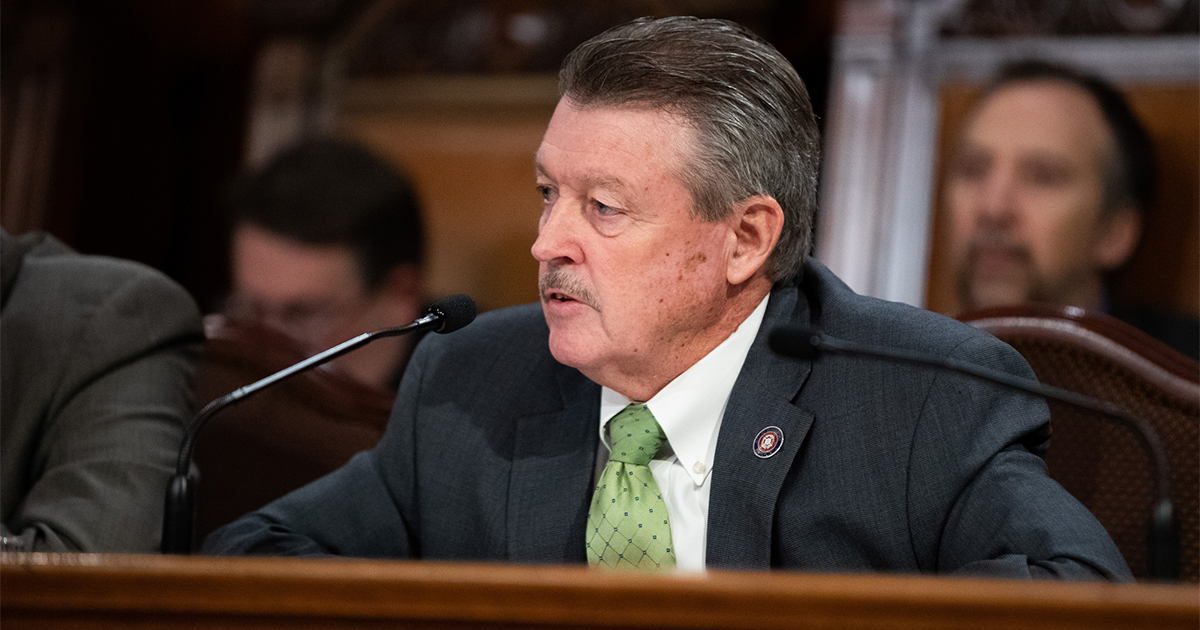
April 25, 2019
Harrisburg – April 25, 2019 – State Sen. Jim Brewster (D-Allegheny/Westmoreland) – a strong advocate for additional mental health funding — applauded state Auditor General Eugene DePasquale’s recent call for more mental health resources to prevent gun deaths.
“A key to reducing reduce gun deaths is properly funding mental health services,” Brewster said.
At a visit to a central Pennsylvania emergency room Tuesday, DePasquale drew the connection between the lack of mental health funding and firearm deaths, according to media reports.
“We need additional mental health services and facilities,” Brewster said.
Earlier this year, Brewster called for using a portion of the estimated $581 million from the legalization of marijuana to build facilities to help those struggling with mental health issues. The McKeesport lawmaker said he is also working to garner additional dollars for mental health through the state budget process.
“If marijuana is legalized, the revenue generated from its taxes and regulation should be earmarked for specific purposes,” Brewster said. “Providing more funds for mental health services and new facilities should be a priority.”
Last November, DePasquale issued a report “A Safer Pennsylvania: A Community Approach to Firearm Safety” that included 12 recommendations. The first two recommendations called for expanded access to mental health care and embarking on an awareness campaign to help people overcome the stigma associated with seeking mental health services.
-30-
October 13, 2016
Monroeville – October 13, 2016 – At the request of state Sen. Jim Brewster (D-Allegheny/Westmoreland), the Senate Democratic Policy Committee today held a hearing on the role of charter schools in public education.
“I hope today’s hearing gives us a better sense of how the charter school system works; how it complements — or detracts from traditional public schools; and ways we can make these schools more efficient, transparent and accountable,” said Sen. Lisa Boscola (D-Northampton/Lehigh), who chairs the committee.
Brewster, who is introducing charter school reform legislation, added, “Charter schools must be accountable to the taxpayer and demonstrate that they are fiscally sound and properly supported by the community.
“I asked that this hearing be held in Monroeville to give our region’s school officials, as well as representatives from the charter school community, the opportunity to offer their views on this important issue.”
Boscola said she was pleased with the diverse make-up of the panel, which included state officials, public school superintendents, charter school administrators and others.
Calling Pennsylvania’s charter school law the “worst in the nation,” State Auditor General Eugene DePasquale issued a 95-page audit last month that revealed numerous examples of financial mismanagement, conflicts of interest and poor oversight. DePasquale testified at today’s hearing.
Many of the critical findings recommendations in DePasquale’s 2014 charter school report were incorporated into Brewster’s legislation. The bill would require greater school board and Department of Education oversight, toughen the fiscal viability requirements for charter school applicants, ban charter board members from having a financial interest in leasing arrangements, step up teacher certification, and require approval from all of the school districts where a charter school draws 25 or more students from. The Brewster legislation would also place a moratorium on new cyber-charter schools.
According to the state Department of Education, Pennsylvania has 162 “bricks and mortar” charter schools (20 in Allegheny County), and 14 cyber charter schools.
Claiming that charter schools disproportionately harm poorer school districts, Mckeesport Area School District Superintendent Dr. Rula Skezas called charter schools the top financial problem for public schools.
“The two most obvious effects that charter schools have had on our school districts are that they have significantly drained the resources available to those students who remain in our schools; and created considerable increased costs for our taxpayers,” Skezas said.
Woodland Hills School District Superintendent Alan Johnson added that his school district will spend nearly $15 million of its $90 million budget on charter school tuition.
Ron Sofo, who serves as CEO of the City Charter High School in Pittsburgh, countered that his school provides a quality education “at $6,000 to $8,000 less per pupil than our authorizing school district.” He argued that charters and public school districts should engage in more collaboration and less competition.
Joining Brewster and Boscola at the hearing were Senate Democratic Leader Jay Costa (D-Allegheny), and Sen. John Wozniak (D-Cambria).
The following testified at the hearing:
- Matthew Stem, deputy secretary, Pennsylvania Department of Education;
- Pennsylvania Auditor General Eugene DePasquale;
- Dr. Rula Skezas, superintendent of the McKeesport Area School District;
- Nathan Benefield, vice-president of policy, Commonwealth Foundation;
- Anthony Pirrello, vice-president, PA Coalition of Public Charter Schools Board, & CEO, Montessori Regional Charter School, Erie;
- Ron Sofo, CEO, City Charter High School, Pittsburgh; and
- Richard Livingston, president of the Clairton City School Board
- Jeremy Resnick, Keystone Alliance for Public Charter Schools, executive director, Propel Schools, Pittsburgh
- Dolores McCracken, vice president, PSEA
# # #
Contact: Charles Tocci
Phone: 717-787-5166
Email: ctocci@pasenate.com
October 6, 2016
Harrisburg – Oct. 6, 2016 – A new, sweeping charter school reform proposal intended to address transparency, fiscal solvency and accountability issues was detailed today by state Sen. Jim Brewster (D-Allegheny/Westmoreland).
“Charter schools must be accountable to the taxpayer,” Brewster said. “They must demonstrate that they are fiscally sound and properly supported by the community.
 “Recent reports and audits by the state auditor general revealed that the current charter school law is full of gaping holes that puts traditional public schools at a real disadvantage in trying to manage the impact of charter schools on their operations.”
“Recent reports and audits by the state auditor general revealed that the current charter school law is full of gaping holes that puts traditional public schools at a real disadvantage in trying to manage the impact of charter schools on their operations.”
Brewster said his reform proposal includes suggestions offered by state Auditor General Eugene DePasquale over the last several years to produce a comprehensive reform of charter and cyber charter schools.
“It has become abundantly clear that systemic changes are needed in how brick and mortar and cyber charters operate in Pennsylvania,” Brewster said. “There is a growing frustration that charters are unaccountable.
“The auditor general has made a number of worthwhile recommendations and I’ve combined some of these ideas with other features to produce what I believe is an excellent starting point for comprehensive reform.”
Brewster said it is important to keep in mind that the original purpose of charter schools was to be an outlet for education innovation and share best practices with the school district.
The McKeesport lawmaker said his plan includes:
- Requiring local school boards to sign off on any financing arrangement with a local industrial development authority or other government entity for a new charter school building project in excess of $1 million;
- Compelling charter schools to post a bond, other type of surety, or agree to a payment escrow arrangement to ensure that they have the financial capability to operate for the entire school year;
- Limiting the scope of the state Charter School Appeal Board to solely determining whether the local school board acted appropriately in reviewing charter school applications;
- Requiring officials from the state Department of Education to visit the proposed site of a charter school to ascertain the condition of its physical plant. Their report will then be made a part of the charter application;
- Mandating that a charter school applicant obtain approval from multiple school districts if the charter school draws more than 25 students from a specific district;
- Upgrading accountability by requiring a quarterly report on the operations of the charter school to the local school board – with the report delivered in person by a charter school official;
- Making a structured financial impact statement, consisting of an estimation of enrollment multiplied by tuition payments, part of the charter school application. The impact statement may serve as the justification for denial of a charter application;
- Increasing the percentage of certified teachers from 75 percent to 90 percent of faculty, after grandfathering in current faculty;
- Prohibiting charter board members from receiving payments for school lease arrangements. This issue was highlighted in August in the auditor general’s report; and
- Imposing a moratorium on the approval of new cyber-charter schools, given the recent reports of poor test scores.
Brewster said these reform provisions are a beginning and that other elements could be added.
“We need to dig deep and look critically at the charter law to make sweeping changes,” Brewster said. “In this year alone, the auditor general has pointed out that the reimbursement process is flawed, that there were too many reimbursement appeals and that the cyber charter law reeked with ethical issues, poor oversight and a lack of transparency.
“It is clear that the charter law is not helping schools, charters themselves or the taxpayers.”
In 2014, DePasquale released his recommendations to improve the charter law. These suggestions called for an independent board to oversee charter school processes and functions — including lease reimbursements and student enrollment. He also suggested public hearings involving charter changes, limits on fund balances and guidelines on calculating teacher certification benchmarks.
Brewster said a responsible and balanced reform approach can attract support from charter advocates as well as those who have been critical of the proliferation of charter schools. He said his plan is an excellent platform for creating a partnership between charters and traditional public schools.
“The reform plan that I am offering is intended to bring charters and traditional public schools together,” Brewster said. “Children should be guaranteed a quality education and taxpayers assured that their tax dollars are being used wisely.”
The McKeesport lawmaker said he realizes that time is short this year to make any move toward charter reform, but that by introducing legislation now there will be greater awareness of the issues involved in crafting meaningful reform. He said the measure will also be reintroduced next session.
“We need a reasonable starting point to engage all sides in a substantive dialogue,” Brewster said.
Brewster said that he hoped that many of these issues will be discussed at a Senate Democratic Policy Committee hearing on Oct. 13 at the Monroeville Municipal Building in Monroeville.
-30-


 “Recent reports and audits by the state auditor general revealed that the current charter school law is full of gaping holes that puts traditional public schools at a real disadvantage in trying to manage the impact of charter schools on their operations.”
“Recent reports and audits by the state auditor general revealed that the current charter school law is full of gaping holes that puts traditional public schools at a real disadvantage in trying to manage the impact of charter schools on their operations.”